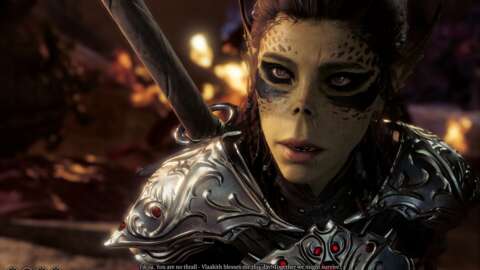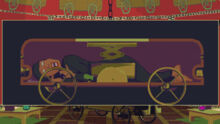I’ll always have a soft spot for the games I’d play with my friends for hours at a time while we jostled each other on the couch and screamed at each other for any perceived betrayal. You know the ones: your Mario Karts and Mario Parties. Games where forging flimsy alliances against the one player who is perceived as the greatest threat, or being a filthy scumbag of a traitor who delights in chaos, are things that are not actually a part of the core gameplay loop in these games, but we as a society have decided that they should be. They are the video game Unos of the world. Racing game DeathSprint 66 is shaping up to be that kind of experience. I’ve played DeathSprint 66 twice now–once at Summer Game Fest and again recently at a preview event–and both times, the game tickled the lizard part of my brain that enjoys snatching away a victory from a friend at the last minute and offering up nothing more than a coy smile.
DeathSprint 66 sees you and seven other players (or bots!) race around tracks at breakneck speeds, utilizing augmented suits to sprint at high speeds, drift around corners, grind along rails, wall-run, and make incredible acrobatic leaps. All the while, the track and the other players pose as constant dangers–shifting laser grids and massive buzzsaws dot each track and items like heat-seeking drones and landmines can be picked up and used by you and your competitors. It’s a dangerous competition, but thankfully you’re only racing as your character’s clone–and you bring a handful of backups with you to each race, so every blood splatter or eviscerated limb is only a few seconds of delay in your day.

Nearly every aspect of DeathSprint 66 is geared around the mayhem and the process of taking advantage of others to improve your own chances of success (running directly behind a competitor and in the draft they create, for example, grants you a quick burst of speed to pass them by). DeathSprint 66 is ripe for friendly betrayal, and I felt nostalgic for Sonic Riders while playing it (the first one, obviously; not its weird sequels). It’s also very approachable–though the tougher tracks are trickier to get around, DeathSprint 66 is a mechanically simple game, and a few runs around each track will give you a pretty good idea of where you can go. Once you grasp that understanding, it’s just a question of practice. If you’ve played an arcade racer like Mario Kart or Sonic Riders, you already have an understanding of the type of game DeathSprint 66 is.
That said, there are a few ways in which DeathSprint 66 falls short of what’s come before. The most blatant is the aesthetic variety of the tracks, which is to say there isn’t any. Though each track offers a unique challenge in terms of its layout–you’ve got your traditional figure-eight, for instance, and then your more dastardly setups like one track that sees you needing to regularly get over huge pits of saw blades–they all take place in the same city and largely look the same. That’s not a dealbreaker for me when it comes to wanting to grab DeathSprint 66, but it does interfere with any of the tracks developing any sort of personality.

This issue extends to character creation, too. You can customize your character somewhat, fitting them with different racing suits and picking from a collection of different color schemes, but it’s not enough–you can’t easily distinguish between different racers once everyone is in motion. If someone is going to throw a buzzsaw at me, I want to know exactly who to blame before they have a chance to fake how they don’t know what I’m talking about. And if I see someone wallrunning behind me, I want to be able to know exactly which of my friends I should be making a deal with before betraying said sucker.
These aspects of competitive arcade racers–knowing the track and being able to identify your competitors at a glance–aren’t crucial to the genre, but they do make them more fun, and it’s disappointing to see DeathSprint 66 not running out of the gate with that already locked down. As a live-service game, it’s entirely possible new tracks will be added post-launch that are aesthetically distinct from what the game starts with, and that additional character customization options could be implemented that are more wacky and visually clear-cut than the generic choices the game is starting with. But the structure of the game is already a great time, and I can’t wait to trick my friends into picking it up on the promise that it will be a chill time for all.
DeathSprint 66 is set to launch on PC in 2024.














